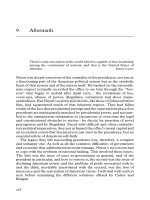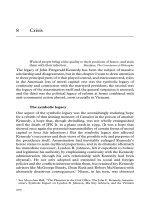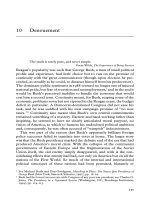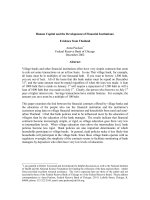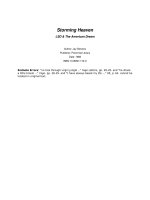Moral capital and the American presidency - Aftermath
Bạn đang xem bản rút gọn của tài liệu. Xem và tải ngay bản đầy đủ của tài liệu tại đây (100.68 KB, 17 trang )
9 Aftermath
There is only one nation in the world which is capable of true leadership
among the community of nations, and that is the United States of
America.
Jimmy Carter
Nixon was deeply conscious of the centrality of the presidency, not just as
a functioning part of the American political system but as the symbolic
heart of that system and of the nation itself. He banked on the extraordi-
nary respect normally accorded the oYce to see him through the ‘‘hor-
rors’’ that began to unfold after April 1973 – the revelations of lies,
cover-ups, abuses of power, illegalities, corruption and sheer mean-
spiritedness. But Nixon’s actions and deceits, like those of Johnson before
him, had squandered much of that inherent respect. They had fallen
victim of the fact that presidential prestige and the expectations placed on
presidents are inadequately matched by presidential power, and succum-
bed to the omnipresent temptation to circumvent or overcome the legal
and constitutional obstacles to action – by deceit, by assertion of novel
prerogatives and by illegalities. Faced with diYcult and often contradic-
tory political imperatives, they put at hazard the oYce’s moral capital and
set in motion events that fractured not just trust in the presidency, but an
essential article of American self-faith.
The legacy they left succeeding presidents was, therefore, a complex
and unhappy one. As well as all the common diYculties of government
and economy that administrations must manage, Nixon’s successors had
to cope with the problem of national healing. This involved three issues.
The Wrst was the issue of trust in government in general, and of the
president in particular, and how to restore it; the second was the issue of
declining American power and the problem of pride associated with it;
and the third, inevitably intertwined with the second, was the loss of
innocence and the restoration of American virtue. I will deal with each in
turn before examining the diVerent solutions oVered by Carter and
Reagan.
218
The problem of trust
The problem of trust manifested itself in many diVerent ways in the years
after Nixon. On the legal front, the Watergate experience eventually
produced in 1978 an initiative that was to trouble all presidents thereafter.
This was, in eVect, an act of legislative mistrust that provided for the
appointment of independent counsels to investigate illegal actions alleged
against presidents. Independent counselors were given a staggeringly
wide remit in terms of resources, time, investigative leeway, and powers of
subpoena. Once a counsel was appointed to look into a particular allega-
tion of wrongdoing, he or she could choose to follow any other line of
inquiry that might arise in the course of it, however far aWeld. The result
was that presidents, their cabinets, their staVs, even their wives and
acquaintances became subject to perpetual and multiple independent
counsel investigations that dragged on unconscionably, often for years
after a presidency had ended.
1
This was an external check that presidents
were constrained publicly to welcome or tolerate as a guarantee of prob-
ity, however much they hated the often painful intrusion and distraction
from the main job of governing that constant probing entailed. Their own
political task, however, was to establish some positive reasons for the
reinstatement of public trust. Note that this was in reality a two-way
democratic problem, for instilling public trust meant in part learning to
trust the public; the loss of trust had in large part, and most acutely in
Nixon’s case, arisen from administrative distrust of what the public’s
reaction might be if it were told the bitter truth.
Thanks to revisionists, conspiracy theorists and Congressional investi-
gations, public mistrust post-Nixon extended to the whole of executive
government and its agencies. But the Wrst priority must be to get things
right at the top. This was why the nation breathed a sigh of relief when
Vice-President Gerald Ford took oYce after Nixon, having narrowly
avoided impeachment, went into premature retirement. Ford was truly
an accidental president, a man of no previous ambition and in no way
outstanding either politically or intellectually, but universally agreed to be
fundamentally decent and honest. After a brace of presidents who were
too-clever-by-half these were precisely the qualities the nation seemed to
need. And Ford’s presidency did bring to presidential politics a state of
dull normalcy far removed from the excitement, controversy and scandal
that had marked it since 1961, for which Americans had cause to be
grateful. Yet he himself is best remembered for a single act which
… This is the central subject of Bob Woodward’s Shadow: Five Presidents and the Legacy of
Watergate (New York, Simon & Schuster, 1999).
219Aftermath
destroyed his chance of being elected in his own right – his rapid granting
of a pardon to Richard Nixon for any crimes he may have committed
while president.
2
Ford had begun his presidency with the words ‘‘our long
national nightmare is over,’’ and the pardon, he said, was granted ‘‘to heal
the wounds throughout the United States.’’ Public reaction gave the lie to
both these statements. There were howls of outrage and accusations of a
deal having been struck (a presidency in return for a pardon). Ford seems
in fact to have been motivated by a stubborn sense of loyalty to a man he
admired,
3
but the sudden act smacked of favor, of top politicians looking
after their own, particularly since so many of Nixon’s underlings were left
to face the ordeal of trial and imprisonment.
A Harris poll in 1976, the year of Carter’s election and Ford’s defeat,
found that only 11 percent of respondents felt ‘‘great conWdence’’ in the
executive branch as compared to 41 percent in 1966.
4
Trust was some-
thing that all candidates had now to address in one way or another. One
response was the populist absurdity of running for the highest political
oYce in the land on anti-political rhetoric; if candidates could not con-
vincingly deny they were politicians, they could at least assert their
uncontamination by the corrupt politics of federal government, their
status as Washington outsiders. It was a line that Reagan managed to run
through nearly the whole eight years of his presidency. In 1999, even Al
Gore, a beltway insider par excellence, felt impelled to establish his cam-
paign headquarters in Nashville to suggest symbolic distance from the
distrusted capital. It was Carter, as a new Democrat from the new South
with only gubernatorial experience in Georgia as political baggage, who
pioneered this line. Vietnam and Watergate had altered what James
MacGregor Burns called the ‘‘structure of opportunity’’ of American
politics, making outsiderdom an attractive and possible path to power.
Carter also went further than most in stressing his personal honesty and
trustworthiness. In professing his lack of selWsh interest in seeking power,
he drew heavily on the American myth of virtue and innocence, saying
that he wanted only what everyone wanted, ‘‘to have our nation once
again with a government as good and honest and decent and truthful and
fair and competent and idealistic and compassionate, and as Wlled with
love as are the American people.’’ He also made a promise absurd for any
politician, however personally honest, to make: he promised never to lie
to the people, never to make a misleading statement and never to betray
See Richard Reeves, A Ford, Not a Lincoln: The Decline of American Political Leadership
(London, Hutchinson, 1976), pp. 97–101.
À See Woodward, Shadow, pp. 3–38.
à Cited in John Dumbrell, The Carter Presidency: A Re-evaluation (Manchester, Manchester
University Press, 1995), p. 22.
220 Moral capital and the American presidency
their trust. If he ever lied, he said, they could take him out of the White
House.
5
Understandable as this might have been with the specter of
Watergate hovering still so near and given Carter’s genuine conviction
of his own born-again purity, it was nevertheless a dangerous tactic.
Promises of exceptional probity raise either exaggerated hopes or exag-
gerated cynicism, but they inevitably raise levels of scrutiny while lower-
ing tolerance of discovered slips. Carter’s campaign promises gave him an
early lead in the polls, but this evaporated at the end because of accusa-
tions of temporizing on major issues, a worrying ‘‘fuzziness’’ on policy.
This form of deceit is a political necessity in democratic politics where
candidates, to gain power, must appeal across many constituencies while
oVending none, but it is bound to be more harshly judged as a reXection
of individual character where a candidate has promised exceptional hon-
esty and frankness. In the White House, Carter’s moral reputation largely
recovered (he was the nearest thing to a saint the White House ever had,
according to one of his speech-writers),
6
though his loyal defense of his
friend Bert Lance, director of the OYce of Budget and Management,
accused of Wnancial improprieties back in Georgia, caused a severe drop
in his approval rating in 1977. The dramatic decline in Carter’s standing,
however, had causes other than perceived venality or deceit, as we shall
see later.
Subsequent presidents suVered much more than Carter from a gap
between ethical commitment and actual performance. In the case of
Reagan, the so-called ‘‘teXon’’ president to whom no scandal would stick,
his popular presidency closed under the pall of the Iran–Contra scandal.
This followed disclosure of the secret breach of a Wrm presidential com-
mitment – no deals with terrorists – and the linked, secret pursuit of a
Congressionally disapproved policy in Nicaragua. The deceit of Congress
and people was reminiscent of the deceits of previous presidencies. Coral
Bell comments, however, that ‘‘if Mr. Reagan had not so zealously talked
a high moral line, especially about dealings with terrorists, there would
have been much less shock to US opinion in the disclosure of the actual
dealings.’’
7
Reagan’s successor, George Bush, was also touched by Iran–
Contra (‘‘What did Bush know?’’), but the thing that really ethically
hobbled his presidency was his famous broken campaign promise of no
new taxes (‘‘Read my lips!’’). Bill Clinton, in his turn, came to power
Õ Betty Glad, Jimmy Carter in Search of the Great White House (New York, W. W. Norton &
Co., 1980), pp. 354–355.
Œ Hendrik Hertzberg, ‘‘Jimmy Carter 1977–1981,’’ in R. A. Wilson (ed.), Character Above
All (New York, Simon & Schuster, 1995).
œ Coral Bell, The Reagan Paradox: American Foreign Policy in the 1980s (London, Edward
Elgar, 1989), p. 137, and see especially pp. 138–139: ‘‘As someone said, it was like a John
Wayne movie in which the hero ends up selling guns to the Indians.’’
221Aftermath
promising the most ethical administration the country had ever seen, with
predictable results. The extraordinary events of Clinton’s presidency,
however, appeared to shift the trust question to another dimension, with
his approval ratings apparently revealing a novel distinction between job
performance and personal moral trustworthiness – of which more later.
The problem of trust and politicians is, of course, perennial and univer-
sal (which is what makes the statement ‘‘Trust me, I’m a politician’’ a
joke in itself). But in America this ordinary problem had acquired
broader ramiWcations because of the pivotal role of the presidency and the
part that presidents had played in undermining the American myth. At
issue was not just what people thought of the moral quality of their leaders
but what they thought of America itself and of themselves as Americans.
Each new presidential incumbent had to negotiate provisional public
mistrust rather then enjoy provisional trust while not only tackling the
outstanding domestic issues of the day but at the same time bearing the
responsibility of solving the deeper problem of American confusion over
national self-faith and self-conWdence. The latter, I have said, was a
question of the decline of American power and the damage to pride
associated with it, inseparable in America from the question of American
virtue and its fate.
The problem of power and virtue
There was more to the decline of American power than failure in Viet-
nam, which was merely where hubris got its most corruscating comeup-
pance. Important too was the loss of absolute economic dominance that
was a natural result of America’s own policies (sound for both economic
and Cold War political reasons) of helping rebuild, via American credit
and trade policies, the shattered wartime economies of future rivals. In
the 1970s the problems of the almighty dollar – that monetary symbol and
conveyor of American supremacy – were a consequence of West German
and Japanese development exacerbated by inXationary spending on Viet-
nam. The dollar’s decline, along with the oil-price shocks induced by
OPEC (the oil-producers’ cartel), signaled the end of the post-war boom
and of the liberal consensus based on it (funding social reform and the
expectations of labor through economic growth). It was the start of a huge
international economic readjustment toward a complex multipolar world
in which the United States would be, at most, only primus inter pares.
There were also deeply annoying political injuries to American pride in
addition to that suVered in Vietnam. For one thing, the benign intentions
of American aid and involvement in poor countries were increasingly
questioned in the 1960s and 1970s. Soviet–American competition in
222 Moral capital and the American presidency
third-world countries had led to American support for right-wing dicta-
torial regimes with nothing to recommend them but anti-communism;
often these client regimes appeared to function mostly to suppress their
own populations in the interests of the large American extractive and
primary industries that dominated the local economy. Even poor demo-
cratic countries felt themselves victims of this American economic im-
perialism, and in the United Nations General Assembly, where poor
nations formed a majority, they had a forum in which to express their
disgruntlement. The endless critiques and anti-American resolutions
angered the United States and engendered oYcial hostility toward the
organization itself, and a withholding of dues. Meanwhile, in the Middle
East, American material and moral underwriting of the existence of Israel
evoked a diVerently motivated and more virulent anti-Americanism in
Arab countries. This, combined in some places with the familiar com-
plaints of economic and cultural imperialism, fed into a developing
Islamic backlash against modernization. Religious solidarity planted the
seeds of anti-Americanism in even the most forward-looking of Islamic
nations.
All this was largely extraneous to the communist–anti-communist con-
Xict, and ran hurtfully contrary to America’s traditional view of its own
virtue and its beneWcent use of power. It was baZing for Americans to
have their good intentions internationally arraigned. It came to seem that
anything bad that happened anywhere in the world would be blamed
somehow on America, which therefore deserved whatever punishment
and insult that governments, terrorists and protesters might mete out.
(The puzzled defensiveness this evoked in Americans was nicely caught in
the Billy Joel song that chanted a list of the world’s trouble-spots followed
by the refrain: ‘‘We didn’t start the Wre / Though we didn’t light it, we’ve
been trying to Wght it.’’) Had it not been for Vietnam (and the subsequent
tragedy of Cambodia/Kampuchea in which American actions played an
invidious causal role), this weight of critique and hostility might have
been more easily borne. The trouble with Vietnam was that, there,
America (or at least a signiWcant part of it) had condemned itself, found
itself guilty of real sin. Vietnam catalyzed America’s self-doubt and rad-
icalized its self-critique, making it more vulnerably receptive to external
criticism than it otherwise might have been. It also left a residue of vocal
domestic dissidents of the likes of Noam Chomsky, always willing to
believe the worst about America and American intentions.
Such consciousness of sin may evoke, either in individual or collective
life, one of two responses: honest soul-searching and acceptance of
guilt accompanied by a resolve to reform; or simple denial.
8
The Wrst
requires humility and a determination to Wnd honest grounds for the
223Aftermath

